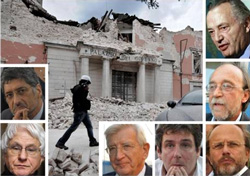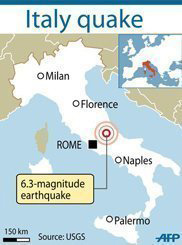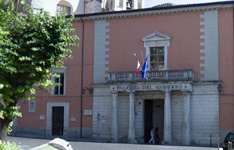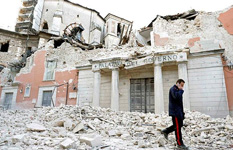redo Jump to...
print Print...
 (by Alberto Sisto, The Chicago Tribune) L’AQUILA, Italy (Reuters) – Six scientists and a government official were sentenced to six years in prison for manslaughter by an Italian court on Monday for failing to give adequate warning of an earthquake that killed more than 300 people in L’Aquila in 2009.
(by Alberto Sisto, The Chicago Tribune) L’AQUILA, Italy (Reuters) – Six scientists and a government official were sentenced to six years in prison for manslaughter by an Italian court on Monday for failing to give adequate warning of an earthquake that killed more than 300 people in L’Aquila in 2009.
The seven, all members of a body called the National Commission for the Forecast and Prevention of Major Risks, were accused of negligence and malpractice in evaluating the danger and keeping the central city informed of the risks. [Judge Marco Billi sentenced each of the defendants to six years in prison—harsher than prosecutors’ original requests of four years. The judge also barred the men from holding public office for life. The sentences won’t come into effect until the end of any appeals process.]
The case has drawn condemnation from international bodies including the American Geophysical Union, which said the risk of litigation may deter scientists from advising governments or even working in seismology and seismic risk assessments.
“The issue here is about miscommunication of science, and we should not be putting responsible scientists who gave measured, scientifically accurate information in prison,” Richard Walters of Oxford University’s Department of Earth Sciences said.
“This sets a very dangerous precedent and I fear it will discourage other scientists from offering their advice on natural hazards and trying to help society in this way.”
The scientists, Franco Barberi, Enzo Boschi, Giulio Selvaggi, Gian Michele Calvi, Claudio Eva and Mauro Dolce as well as Bernardo De Bernardis – a senior official in the Civil Protection Authority – were convicted of criminal manslaughter and causing criminal injury.
 The 6.3 magnitude earthquake struck L’Aquila, in the Abruzzo region, at 3:32 a.m. on April 6 [2009], wrecking tens of thousands of buildings, injuring more than 1,000 people and killing 308. [After the main earthquake struck, L’Aquila and the surrounding area was shaken by another 250 powerful aftershocks within 48 hours. The quake caused damage worth an estimated 10 billion euros ($13 billion), leaving large areas of the city abandoned even today and the community still devastated by the tragedy.]
The 6.3 magnitude earthquake struck L’Aquila, in the Abruzzo region, at 3:32 a.m. on April 6 [2009], wrecking tens of thousands of buildings, injuring more than 1,000 people and killing 308. [After the main earthquake struck, L’Aquila and the surrounding area was shaken by another 250 powerful aftershocks within 48 hours. The quake caused damage worth an estimated 10 billion euros ($13 billion), leaving large areas of the city abandoned even today and the community still devastated by the tragedy.]
At the heart of the case was the question of whether the government-appointed experts gave an overly reassuring picture of the risk facing the town, which contained many ancient and fragile buildings and which had already been partially destroyed three times by earthquakes over the centuries.
The case focused in particular on a series of low-level tremors that hit the region in the months preceding the earthquake and which prosecutors said should have warned experts not to underestimate the risk of a major shock.
Eva’s lawyer Alfredo Biondi said the decision was “wrong in both fact and law” but the verdict, delivered in a tiny improvised court room in an industrial zone outside the still-wrecked city center, was welcomed by relatives of the victims. “This is not thirst for revenge, it is just that our sister is not coming back,” said Claudia Carosi.
More than three years later, much of the once-beautiful medieval city is still in ruins and thousands of people have been unable to return to their homes.
Defense lawyers said earthquakes could not be predicted and even if they could, nothing could be done to prevent them.
“If an event cannot be foreseen and, more to the point, cannot be avoided, it is hard to understand how there can be any suggestion of a failure to predict the risk,” defense lawyer Franco Coppi said before the verdict was delivered.
Prosecutors, who had only sought a four-year sentence, said they did not expect scientists to provide a precise forecast.
But they argued the Commission had given “incomplete, imprecise and contradictory” information on the danger after a meeting on March 31, 2009, a few days before the earthquake.
The case is part of a wider controversy over the disaster in L’Aquila, which has been at the center of a series of bitter arguments over Italy’s disaster preparedness.
Central Italy is continuously shaken by low level tremors, very few of which precede bigger earthquakes and they are generally marked by no more than a brief statement from civil protection authorities.
Key to the dispute is the kind of cautious language, hedged by caveats and reserves which scientists typically use in predicting highly uncertain events, but which can be of limited use as a guideline for the general public.
According to scientific opinion cited by prosecutors, the dozens of lower level tremors seen before the quake were typical of the kind of preliminary seismic activity seen before major earthquakes such as the one that struck on April 6.
Instead of highlighting the danger, they said the experts had made statements playing down the threat of a repeat of the earthquakes which wrecked the town in 1349, 1461 and 1703, saying the smaller shocks were a “normal geological phenomenon.”
Italy is among the most earthquake-prone countries in Europe and has been struck repeatedly by lethal shocks, most recently in May 2012, when 16 people were killed and hundreds injured by a 5.8 tremor in the Emilia Romagna region.
(Additional reporting by Cristiano Corvino and Kate Kelland in London, writing by James Mackenzie; Editing by Alison Williams)
Copyright 2012 Reuters. Reprinted here for educational purposes only. May not be reproduced on other websites without permission from The Chicago Tribune. Visit the website at ChicagoTribune.com.
Questions
1. a) What crimes were six scientists and a government official in Italy accused of committing regarding the 2009 L’Aquila earthquake?
b) What crimes were the seven actually convicted of committing?
2. On what grounds were the seven convicted? Be specific.
3. What argument did defense lawyers use?
4. What sentence did the seven men receive?
5. Describe the larger controversy associated with the L’Aquila earthquake.
6. a) Define seismologist. Be specific (If you answer: A seismologist is a scientist who does research in seismology, then you need to define seismology)
b) Read the “Background” below the questions, and watch the video under “Resources.” Six of the men are experts in seismology and geology. The seventh was a senior official in the Civil Protection Authority. Do you think the seven men should have been convicted? Do you think the punishment fit the crime? Explain your answers.
Background
Among those convicted were some of Italy’s most prominent and internationally respected seismologists and geological experts. Earlier, more than 5,000 scientists signed an open letter to Italian President Giorgio Napolitano in support of the defendants.
REACTION TO THE CONVICTION FROM SCIENTISTS AROUND THE WORLD:
- “If it stands, this verdict will have a chilling effect on earthquake science in Italy and throughout Europe,” said Sandy Steacy, professor of earthquake physics at the University of Ulster. “Who would now be willing to serve on an earthquake hazard evaluation panel when getting it wrong could mean a conviction for manslaughter?”
- “What those six scientists said was correct and any seismologists would support it,” said Roger Musson at the British Geological Survey. “It seems to be wrong that they should be prosecuted for offering scientific advice to the best of their ability.”
- In the United States, Michael Halpern at the Union of Concerned Scientists lobby group said in a blog: “This is an absurd and dangerous decision that U.S. officials should rebuke, and Italian President Giorgio Napolitano should overturn.”
- “This bizarre verdict will chill anyone who gives scientific advice, and I hope they are freed on appeal,” said David Spiegelhalter, a professor for the public understanding of risk at Cambridge University. “The lesson for me is that scientific advisors must try and retain control over how their work is communicated, and are properly trained to engage with the public.”
- Some scientists said the advice on the L’Aquila quake could have been communicated more clearly, with more emphasis placed on the small possibility of a major quake, but there was a chorus of condemnation for the verdict. “Imagine if the government brought criminal charges against your local meteorologist for not being able to predict the exact path of a tornado,” said Halpern. “Scientists need to be able to share what they know – and admit what they do not know — without the fear of being held criminally responsible should their predictions not hold up.” (from reuters.com)
Daily “Answers” emails are provided for Daily News Articles, Tuesday’s World Events and Friday’s News Quiz.





